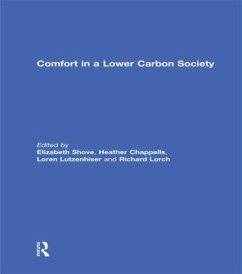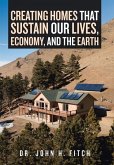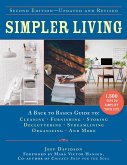Comfort in a Lower Carbon Society
Herausgeber: Shove, Elizabeth; Lutzenhiser, Loren; Chappells, Heather
Comfort in a Lower Carbon Society
Herausgeber: Shove, Elizabeth; Lutzenhiser, Loren; Chappells, Heather
- Gebundenes Buch
- Merkliste
- Auf die Merkliste
- Bewerten Bewerten
- Teilen
- Produkt teilen
- Produkterinnerung
- Produkterinnerung
Historians, sociologists, environmentalists, geographers, and cultural theorists provoke and stimulate debate about the future of comfort in a lower carbon society. This book was published as a special issue of Building Research & Information.
Andere Kunden interessierten sich auch für
![Design and Assessment of Sustainable Products Design and Assessment of Sustainable Products]() Design and Assessment of Sustainable Products198,99 €
Design and Assessment of Sustainable Products198,99 €![Go Gently Go Gently]() Bonnie WrightGo Gently18,99 €
Bonnie WrightGo Gently18,99 €![Creating Homes That Sustain Our Lives, Economy, and the Earth Creating Homes That Sustain Our Lives, Economy, and the Earth]() John H. FitchCreating Homes That Sustain Our Lives, Economy, and the Earth26,99 €
John H. FitchCreating Homes That Sustain Our Lives, Economy, and the Earth26,99 €![Minimal Minimal]() Stéphanie MandréaMinimal21,99 €
Stéphanie MandréaMinimal21,99 €![Simpler Living, Second Edition--Revised and Updated Simpler Living, Second Edition--Revised and Updated]() Jeff DavidsonSimpler Living, Second Edition--Revised and Updated24,99 €
Jeff DavidsonSimpler Living, Second Edition--Revised and Updated24,99 €![Blue Dharma - A Responsibility Called Earth Blue Dharma - A Responsibility Called Earth]() Rajendra KumarBlue Dharma - A Responsibility Called Earth38,99 €
Rajendra KumarBlue Dharma - A Responsibility Called Earth38,99 €![The Grace-Filled Homestead The Grace-Filled Homestead]() Lana StennerThe Grace-Filled Homestead29,99 €
Lana StennerThe Grace-Filled Homestead29,99 €-
-
-
Historians, sociologists, environmentalists, geographers, and cultural theorists provoke and stimulate debate about the future of comfort in a lower carbon society. This book was published as a special issue of Building Research & Information.
Hinweis: Dieser Artikel kann nur an eine deutsche Lieferadresse ausgeliefert werden.
Hinweis: Dieser Artikel kann nur an eine deutsche Lieferadresse ausgeliefert werden.
Produktdetails
- Produktdetails
- Verlag: Taylor & Francis
- Seitenzahl: 134
- Erscheinungstermin: 1. September 2009
- Englisch
- Abmessung: 277mm x 218mm x 15mm
- Gewicht: 612g
- ISBN-13: 9780415550895
- ISBN-10: 0415550890
- Artikelnr.: 27869509
- Herstellerkennzeichnung
- Libri GmbH
- Europaallee 1
- 36244 Bad Hersfeld
- gpsr@libri.de
- Verlag: Taylor & Francis
- Seitenzahl: 134
- Erscheinungstermin: 1. September 2009
- Englisch
- Abmessung: 277mm x 218mm x 15mm
- Gewicht: 612g
- ISBN-13: 9780415550895
- ISBN-10: 0415550890
- Artikelnr.: 27869509
- Herstellerkennzeichnung
- Libri GmbH
- Europaallee 1
- 36244 Bad Hersfeld
- gpsr@libri.de
Elizabeth Shove is professor of Sociology at Lancaster University. She has written widely on theories of practice, technology, consumption, environment and everyday life. She is co editor (with Frank Trentmann and Rick Wilk) of Time, Consumption and Everyday Life: Practices, materiality and culture (Berg, forthcoming 2009). Heather Chappells is honorary research fellow in Geography at Lancaster University. She has undertaken several projects examining the social, institutional and cultural dimensions of sustainable consumption, provision and practices in the UK energy and water sectors - including Future Comforts: Reconditioning indoor environments with Elizabeth Shove (ESRC, 2003-2004). Loren Lutzenhiser is Professor of Urban Studies and Planning at Portland State University. His research focuses on the environmental impacts of socio-technical systems, particularly how urban energy and resource use is related to global environmental change.
1. Introduction: Comfort in a Lower Carbon Society Elizabeth Shove,
Heather Chappells, Loren Lutzenhiser and Bruce Hackett 2. Air-conditioning
and the 'homogenization' of people and built environments Stephen Healy 3.
Re-contextualizing the notion of comfort Raymond Cole, John Robinson,
Zosia Brown and Meg O'Shea 4. Conquering winter: US consumers and the cast
iron stove Howell Harris 5. Growth in mobile air-conditioning: a
socio-technical research agenda Graham Parkhurst and Richard Parnaby 6.
Understanding heat wave vulnerability in nursing and residential homes Sam
Brown and Gordon Walker 7. Escaping the house: comfort and the California
garden Gail Cooper 8. Comfort expectations: the impact of demand-management
strategies in Australia Yolande Strengers 9. New standards for comfort and
energy in building J. F. Nicol and M. A. Humphreys Commentaries 10. The
conditioning of comfort Harold Wilhite 11. Comfort in a brave new world
Ian Cooper 12. Are Comfort Expectations of Building Occupants Too High?
Mithra Moezzi 13. Cold Comfort in a High Carbon Society? Jim Skea 14.
Studying thermal comfort in context Russell Hitchings
Heather Chappells, Loren Lutzenhiser and Bruce Hackett 2. Air-conditioning
and the 'homogenization' of people and built environments Stephen Healy 3.
Re-contextualizing the notion of comfort Raymond Cole, John Robinson,
Zosia Brown and Meg O'Shea 4. Conquering winter: US consumers and the cast
iron stove Howell Harris 5. Growth in mobile air-conditioning: a
socio-technical research agenda Graham Parkhurst and Richard Parnaby 6.
Understanding heat wave vulnerability in nursing and residential homes Sam
Brown and Gordon Walker 7. Escaping the house: comfort and the California
garden Gail Cooper 8. Comfort expectations: the impact of demand-management
strategies in Australia Yolande Strengers 9. New standards for comfort and
energy in building J. F. Nicol and M. A. Humphreys Commentaries 10. The
conditioning of comfort Harold Wilhite 11. Comfort in a brave new world
Ian Cooper 12. Are Comfort Expectations of Building Occupants Too High?
Mithra Moezzi 13. Cold Comfort in a High Carbon Society? Jim Skea 14.
Studying thermal comfort in context Russell Hitchings
1. Introduction: Comfort in a Lower Carbon Society Elizabeth Shove,
Heather Chappells, Loren Lutzenhiser and Bruce Hackett 2. Air-conditioning
and the 'homogenization' of people and built environments Stephen Healy 3.
Re-contextualizing the notion of comfort Raymond Cole, John Robinson,
Zosia Brown and Meg O'Shea 4. Conquering winter: US consumers and the cast
iron stove Howell Harris 5. Growth in mobile air-conditioning: a
socio-technical research agenda Graham Parkhurst and Richard Parnaby 6.
Understanding heat wave vulnerability in nursing and residential homes Sam
Brown and Gordon Walker 7. Escaping the house: comfort and the California
garden Gail Cooper 8. Comfort expectations: the impact of demand-management
strategies in Australia Yolande Strengers 9. New standards for comfort and
energy in building J. F. Nicol and M. A. Humphreys Commentaries 10. The
conditioning of comfort Harold Wilhite 11. Comfort in a brave new world
Ian Cooper 12. Are Comfort Expectations of Building Occupants Too High?
Mithra Moezzi 13. Cold Comfort in a High Carbon Society? Jim Skea 14.
Studying thermal comfort in context Russell Hitchings
Heather Chappells, Loren Lutzenhiser and Bruce Hackett 2. Air-conditioning
and the 'homogenization' of people and built environments Stephen Healy 3.
Re-contextualizing the notion of comfort Raymond Cole, John Robinson,
Zosia Brown and Meg O'Shea 4. Conquering winter: US consumers and the cast
iron stove Howell Harris 5. Growth in mobile air-conditioning: a
socio-technical research agenda Graham Parkhurst and Richard Parnaby 6.
Understanding heat wave vulnerability in nursing and residential homes Sam
Brown and Gordon Walker 7. Escaping the house: comfort and the California
garden Gail Cooper 8. Comfort expectations: the impact of demand-management
strategies in Australia Yolande Strengers 9. New standards for comfort and
energy in building J. F. Nicol and M. A. Humphreys Commentaries 10. The
conditioning of comfort Harold Wilhite 11. Comfort in a brave new world
Ian Cooper 12. Are Comfort Expectations of Building Occupants Too High?
Mithra Moezzi 13. Cold Comfort in a High Carbon Society? Jim Skea 14.
Studying thermal comfort in context Russell Hitchings








